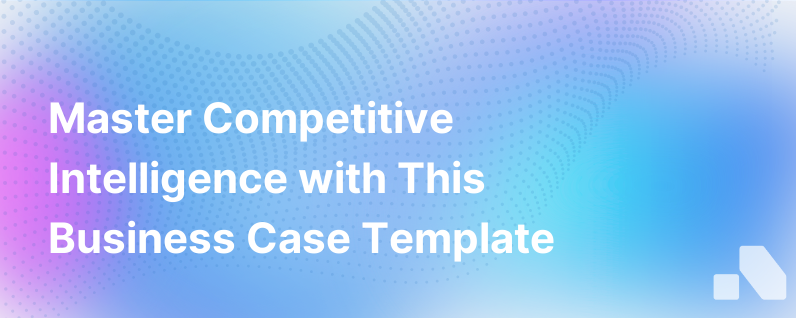
A robust understanding of the competitive landscape is critical for any business. It guides decision-making, shapes strategy, enables risk management, and supports innovation. The competitive intelligence business case is a tool every business leader should consider using. Yet, many executives lack the understanding and resources needed to embark on this insightful journey.
This article will provide a thorough guide to creating a business case for competitive intelligence, including a step-by-step template.
Start with the Basics
Before diving in, it is crucial to understand what competitive intelligence is. Competitive intelligence is the process of gathering, analyzing, and leveraging information about competitors to gain a competitive advantage. It involves keeping tabs on market trends, industry shifts, new competitors, and other external elements shaping the industry environment.
The Role and Value of a Business Case
A business case for competitive intelligence outlines the reasons for implementing a comprehensive competitive intelligence process. It details the expected benefits, the resources required, and the anticipated return on investment.
The business case acts as a rationale for investing time, effort, and money into developing a competitive intelligence strategy, and serves to convince key decision-makers within the organization of this need.
Steps to Craft a Comprehensive Business Case:
1. Identify the Problem:
Start by detailing the challenges your organization is facing. This could be a lack of unique positioning, dwindling market share, increasing competition, or changes in the industry.
2. Propose a Solution:
Next, introduce competitive intelligence as a solution, describing what it involves and how it can address the identified problem. Include details on data collection methods, analysis techniques, and the way findings will be disseminated within the organization.
3. Lay Out the Benefits:
Outline the potential benefits of incorporating competitive intelligence, such as gaining a competitive edge, identifying gaps in the market, informing product development, and enhancing strategic decision-making.
4. Estimate the Cost:
In this section, present an estimated budget for the competitive intelligence initiative. Include the cost of tools, data sources, analysis, and personnel needed.
5. Provide a Timeline:
Give a realistic timeline for when the benefits of the competitive intelligence initiative will start to materialize. Balance enthusiasm with a consideration for the time it takes to gather and analyze data, and to act upon insights.
6. Nail the Conclusion:
Conclude with a compelling summary of why a competitive intelligence strategy is necessary for the organization's success and how it can positively impact important business metrics.
7. Appendices:
Include any relevant support materials such as case studies, reports, data visualizations, or testimonials that strengthen your case.
Here's a practical competitive intelligence business case example:
- Problem: The organization is losing market share due to growing competition.
- Solution: Implementing a competitive intelligence strategy, involving data collection on competitors' activities, analyzing the implications and sharing the findings with relevant stakeholders across the organization.
- Benefits: Allows the organization to react quickly to competitors' moves, identify gaps in the market, inform product development, and plan strategic initiatives.
- Costs: Includes the price of competitive intelligence tools, data sources, and analysts’ time.
- Timeline: A period of 6 to 9 months to fully integrate competitive intelligence processes and start realizing the benefits.
Final Thoughts
A well-crafted business case can significantly enhance the prospects of getting buy-in for a competitive intelligence program within an organization. However, implementing competitive intelligence should not be a cumbersome process.
This is where Aomni steps in. Aomni is an Artificial Intelligence platform for B2B Sales that delivers actionable competitive insights and tailored sales content. With Aomni, organizations can leverage real-time account data, gather insights and apply them strategically within a quarter of an hour. No need for excessive resources or long waiting periods for the payoff.
By blending the case for competitive intelligence with forward-looking tools like Aomni, businesses stand a better chance at navigating the competition and gaining a sustainable competitive advantage.